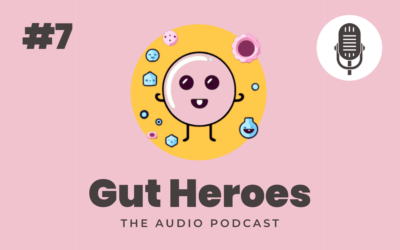Welcome to another Gut Heroes podcast!
Changing your diet is hard, really hard. We don’t all have time or headspace and modern life makes it even more difficult. We are bombarded with temptation, from every angle.
In this episode, I look at why refined sugar and ultra-processed food are often seen as (one of many) ‘smoking guns’ when it comes to autoimmune disease and the impact that cutting down has had on my life.
Disclaimer: Please note, this is for informational purposes only. Gut Heroes does not offer medical advice. We are all different and what works for me may not work for you. I setup Gut Heroes to share information with you. To shine a light on my own personal discoveries (as I currently understand them) and to help you with your own personal research.
Transcript of this Episode:
Today I wanted to talk a bit about sugar and diet in general.
I was thinking about a story a friend told me the other day, which made something hit home.
I’m guilty of sometimes taking for granted that everyone will have the headspace and ability to make dramatic changes to their diet to tackle something like autoimmune disease, or other health issues.
I’ll start with why this story struck me.
I’ve had such enormous success from changing my diet. Success beyond any medication I’ve ever tried to tackle and get pain relief from what has been a totally crippling condition, ankylosing spondylitis.
It’s been horrible. I wouldn’t say I’m 100% all the time, and I’m sort of doing backflips in the field and all this kind of thing, but I feel amazing. I feel better than I have done for about 20 years, and I have to pinch myself when I say it, but I literally haven’t taken so much as a painkiller for over two and a half years now. That should hopefully give you an idea of just how profoundly this has affected my life. I couldn’t get out of bed some days without taking a handful of painkillers. Short walks were extremely painful and tying my shoelaces was impossible. This is all stuff you’ll hear me repeat over and over again, but I think it’s really important just to reflect on the before and the after. I try to quantify this, but it has to be somewhere between 70% and 90% of this is down to me changing my diet. I’ve just done so much testing, I’ve done so many diary entries and records in my spreadsheet, it’s just the correlation is so clear, there’s no other thing for it really. That’s why I’m so passionate about talking about this stuff, and it’s why I’m so passionate about sharing studies on Gut Heroes and about trying to find other people to share their stories, which I know I need to do better on. I’ve got a full-time job as well, so it’s quite hard to find the time between editing these and uploading content and all that kind of stuff. But I’m not doing this to make any money. I’m not selling anything on here. If I can change even a handful of people’s lives and show them what’s worked for me and show them what maybe, hopefully, could work for them or could have some positive effect for them, then that would just be amazing. It’s one of those situations where I just can’t sit on the information. It has had such a profound effect. But the thing that really hit home to me, and this is a long-winded way of getting back to the start of this podcast, is I was talking to a friend, and they have a close friend who is really struggling with their health. They have an autoimmune disease. The friend I was talking to didn’t know what the name of it was, and it was something he couldn’t pronounce, I think. But it was definitely an autoimmune disease. It was affecting the joints. It wasn’t ankylosing spondylitis, but it was something else. He’d been so struck by the success I’d had. This is someone I’ve known, must be 15, 20 years, a long time, so he knew that constant back pain and weird bouts of me sort of limping and taking pills and all that kind of stuff. He knew that was a big part of my life. I wasn’t someone who really complained about it, but you can’t hide a zombie shuffle. And you know that kind of stiff back, that odd hunched look that can sometimes accompany something like ankylosing spondylitis. So he knew how profound effect this is having on me, and he just immediately shared Gut Heroes and he shared my story with his friend, and I thought this is great, and I said to him look anytime they want to speak to me, they can give me a call, whatever, I’m really happy to help. And they looked at the website, and they didn’t, they said, “Oh yeah, that sounds great, yeah maybe I’ll try that.” And he spoke, I spoke to him the other day, and he said he’d seen this friend, he’d met up with them for a drink at the pub, and they’d gone back to his house afterwards because he wanted to say hello to his partner, and they just wanted to hang out together. And on the way to the house, he stopped at a newsagent, and he bought six litres of Coca-Cola, Fanta, and some other fizzy drink, like absolute liquid sugar, basically. And it just struck me that this is so ingrained in our society, the idea of sugar and fizzy drinks and ultra-processed food and things that are just constantly marketed to us and bombarded to us and contained in almost everything we eat. It’s absolutely playing on the inbuilt addiction or attraction, rather, humans have towards sugar, which is something which really is built into our genetics and our being because it was something that was scarce to find in nature. And you have all these food producers who are, through technology and human ingenuity and a lot of human suffering actually in the past, but basically now through technology, able to extract ridiculously concentrated amounts of sugar, way, way more than the human body can ever process or take in a healthy way. And we’re shoving it into everything. We’re shoving it into the liquids we drink and the foods we eat casually, the snacks, the meals, everything. And if someone’s really wanting to make a change and try something with their diet, it’s really hard, especially if they’re using food as a comfort. One of the things people find hard is that with autoimmune disease, pain and fatigue is such a crushing part of it, and taking away one of life’s little pleasures, one of life’s great pleasures, your favourite snack or sugary drink or cake or crisps or whatever it is, something that just gives you that little bit of joy in what can be an otherwise bleak day where you feel like you’re battling, you’re battling to stay awake. Moving is painful, even sitting can be painful. So just that distraction on the taste buds and that little feeling of satisfaction and satiation and just feeling different, that’s a big ask to say to someone, “Well, maybe you should upend everything you eat and change this, that, and the other, and there’s no guarantee it will work,” and all of this stuff. I think it’s overwhelming and it’s too much, and I’m hoping that by maybe doing some of these podcasts and definitely getting more people on to talk about their experiences, I can just help maybe shine a light on why it is so, or can be so profoundly life-changing. And regardless of autoimmune disease and inflammation and pain and all those things, I would actually genuinely say, if a magic wand was waved and tomorrow someone said, “Look, your ankylosing spondylitis, it’s gone. We’ve done some amazing gene therapy and we’ve repaired your gut lining and your microbiome’s all fixed and all of that.
And they said, “You’ve got the pain-free existence of a typical human your age who doesn’t have this.” Obviously, I’d be absolutely overjoyed if it were like a lottery ticket, but I wouldn’t go back to eating sugar. I just wouldn’t. I wouldn’t go back to refined sugar. I wouldn’t go back to eating ultra-processed food. I do get some sugar. I eat some berries, I eat some fruit, I do eat honey very occasionally, but I just don’t have refined sugar, and it is something I do not miss at all. And I never thought I’d say that because I had sugar in everything. Like most people I know, that’s how products are packaged and delivered to us, that’s what they contain. But having cut them out, I guess I missed them for a bit, but it really has not been any kind of trauma, and I’m talking to you over two and a half years down the line. I didn’t miss sugar even after a few months, definitely not, and the not having the highs and lows in terms of energy and brain fog, that alone would make me not go back, and it doesn’t mean I would be or am crazy militant where I’d sort of, you know, run out of a room screaming if I accidentally had some sugar or anything like that. I drink beer and I will occasionally have wine as well, although less so, and there’s sugar in that. I’m not militant or fanatical about it, but I am fanatical about just taking a step back and looking at the structure of the Western diet that we are all accustomed to and just going, “Is this a real food? Is this something my body in particular is accustomed to take? And are the things I’m eating helping me?” Is it worth just trying, just for a few weeks or a few months ideally, a different path and just seeing what would happen if I cut out sugar and if I cut out foods that could trigger my particular condition? So for me personally, for ankylosing spondylitis, I cut out starch and cow dairy and sugar as I’ve said obviously. So those are the three main things I cut out, and that’s what is working magically for me. Within actually days, but particularly within months and just better and better as time has gone on. The gap between flares is unbelievable now, and when I do get them, they’re short-lived because I know what to do. And when I don’t have them, I just feel so much better, like the stiffness. That was something that was always there even when I wasn’t in flare. I just felt like a solid block. And with fizz, my whole spine felt fizzy and uncomfortable, and doing anything that involved bending over could potentially trigger a flare, and it was uncomfortable as well. And so it’s not just about avoiding flares, it’s about your overall wellbeing, how you feel day to day. And I just cannot stress how amazing the payoff is. And it just involves doing a bit of note-taking. What am I eating? What have I eaten today and tomorrow and the next day? And what am I going to eat? So planning. And I’ll do a separate podcast on this, but I actually much prefer it. I find it much easier. I’m never overwhelmed by choice anymore. The things I really love, I really taste the things I eat. Because the funny thing is when you cut out these really strong synthetic things, concentrated sugar or really concentrated sauces and all that kind of stuff, stuff that’s often been put together in labs and hasn’t had proper testing because regulation has been so terrible on the food companies for years now. But having things that are natural, you know, just having natural foods, real vegetables, mushrooms, animal products, and just tasting what they actually taste like, it’s amazing, like it’s delicious, and you really notice things and it gives you a more subtle palette. And that was a weird thing I never expected to get as a sort of side bonus. So yeah, I just really wanted to talk about that really and say I really get it. We are entrenched in a world which says eat this and you’ll be happy and it tastes good and it’s convenient and all this kind of thing, and we’ve had that from the days we were born because it’s broadcasted to us in adverts, on social media, absolutely everywhere, lovely bold, colourful packaging which tells you about all these wonderful flavours and fortified vitamins and it’s on the whole nutrition-free, sugar-laced stuff that is going to make you feel terrible. And I would really, if you get time, go onto Google Scholar or go elsewhere or go on Gut Heroes actually and take a look at some of the studies which connect sugar with inflammation and autoimmune disease and pain and all sorts of horrible conditions. You know I’m just looking at one that I’ve actually put on Gut Heroes, a study called, it’s got a really catchy title, the Glucose Transporter GLUT3 Controls T Helper 17 Cell Responses through Glycotic Epigenetic Reprogramming. I mean I don’t know how they come up with these titles, but in summary, it basically talks about how sugar causes massive inflammation in the body and they’re talking about how eating excess sugar and other carbohydrates over time can lead to the development and the worsening of autoimmune diseases. There’s another one here, a review article from 2022, Excessive Intake of Sugar and a Complicit of Inflammation. High sugar intake has long been recognised as a potential environmental risk factor for increased incidence of many non-communicable diseases, including obesity, cardiovascular disease, metabolic syndrome, and type 2 diabetes. And they go on to talk about how consuming high levels of dietary hexose can impact rheumatoid arthritis, psoriasis, inflammatory bowel disease or syndrome, and low-grade chronic inflammation. And they emphasise that dietary sugars and mixed processed foods may be a key factor leading to the occurrence and aggravation of inflammation. And I’ve just talked about two studies here. I will do a separate podcast or article in the future where I do a deep dive and give you a lot more quotes and context from a broad range of studies because I think it’s really important. I just wanted to emphasise I really do understand if you’re thinking about changing diet, if you’re looking at all this information and not knowing where to turn, and there are so many different things online and people saying this and that and do this with your diet and do that and this will make you feel great. The thing to remember is that we are all different and the thing that helps you might be different from what helps me, but there is overwhelming evidence, overwhelming evidence and no doctor will be upset if you do this, unless you have a really niche condition, and that is giving up refined sugar or massively cutting it down is a really positive thing to do, as is cutting out ultra-processed food. And that’s really one of the things I have no doubt about with everything I’ve been through, everything I’ve researched, everyone I’ve talked to. Sugar and ultra-processed food, they are so damaging for most humans. And I don’t want that for you. And I hope some of the things I’ve shared with you today and some of the things I’ll share with you in the future encourages you just to try, see if you reduce some of these things. I’ve not met anyone who’s
felt worse as a result of cutting out ultra-processed food or cutting down on sugar. It’s really once you get started, it’s quite a low-hanging fruit, and I hope as time goes on and I hope as the studies keep on coming that this will come through with a better understanding in the medical profession and that this will be encouraged more there, and we hold our food producers more accountable as well. But for now, I’m going to keep banging the drum and I’m going to say thank you for listening, and I look forward to talking to you next time.



0 Comments